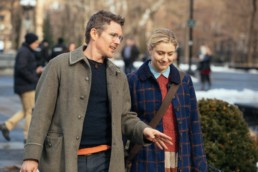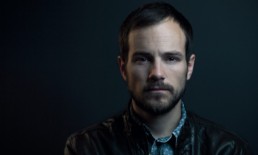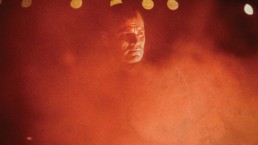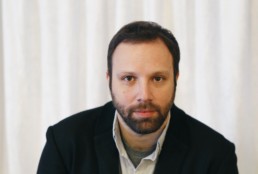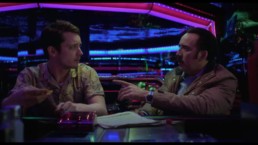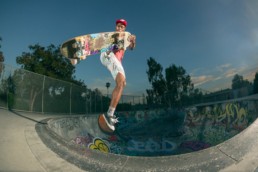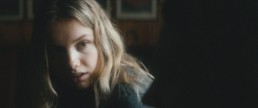Greta Gerwig and Director Rebecca Miller Talk Female Empowerment in 'Maggie's Plan' [LISTEN]
[soundcloud url="https://api.soundcloud.com/tracks/265088376" params="color=ff5500&auto_play=false&hide_related=false&show_comments=true&show_user=true&show_reposts=false" width="100%" height="166" iframe="true" /]
A few weeks back, I caught a screening of "Maggie's Plan" at the ArcLight Hollywood. A few months after its Sundance premiere, the film made its way to Los Angeles and delighted the audience with its offbeat edgy humor about love and relationships. Following the screening, Pete Hammond of Deadline conducted a Q&A with director Rebecca Miller and Greta Gerwig, who, after enduring a red carpet photo shoot earlier in the evening, promptly took off her heels as she sat down in front of the large crowd. Gotta love Gerwig.
From my knowledge of your work, this is your first real "comedy," is that something you were looking to do at this point?
Rebecca Miller: Yeah, I like to hear people laugh in my movies and so I thought I would flip around the ratio of sadness to happiness.
It says it's based on a story by Karen Rinaldi, from an unfinished book. How did you stumble upon an unfinished book?
RM: Karen is one of my best friends and she sent it to me, the Maggie chapters, in an email. Her book, The End of Men, will be published in a year. She sent me four chapters that had Maggie, Odette, and John with the basic premise of a love triangle with the switch. I thought it was such a great idea, so I tried to make it into a screenplay.

What was your inspiration?
RM: Definitely comedies of the 1940s, the genre of "comedies and marriage" specifically.
Greta, this is another great role for you, and you were involved very early on, correct?
Greta Gerwig: Yeah, Rebecca and I had over a year to talk about it and prepare and dream up what it is, which was a real luxury. I knew I wanted to be in the movie because I loved Rebecca's other work and really admired her. I also loved the story and how it kept surprising me, it felt like I was forever reassessing my position of where I thought this narrative was going to go. I found it incredibly romantic but also very truthful about the complexities of love and life. I thought it answered a lot of what I feel.

Maggie is very truthful, there is a line you walk with this character.
GG: I know that Maggie does some things in the movie that, on the face of them, could be hard to take in as an audience member, but I just felt like, on the page, it rendered so beautifully. She had a shining inner truth and a compass of where she was going in the language and the way she chose to live her life that I felt like, that's going to win the day. You just play the honesty of that and it will all fall into place.
Julianne Moore is such a hoot in this movie, that Danish accent is perfect.
RM: She was originally French in the story but I thought she should be from the further North because I thought that somebody who would write the book Bring Back the Geisha and be tolerant of affairs is, to me, more Northern European. I also thought nobody hears Danish accents so much. My mother had an accent that nobody could ever imitate, it was from many European countries, so [Julianne] developed an accent that's very specific to the character. We talked about everything, even the fact that she should have a really tight topknot on the top of her head. It was a nice collaboration with her.

Did it help to have a female power behind the scenes?
GG: Oh yeah, I think Rebecca is a special director because of who she is as a person more than her gender, much more than her gender. I think directors are...directors. They're all control freaks. Haha, in a good way! You want them to be that way. They're amazing, they're world builders. So in that sense, it's no different than working with a male director.
One of your co-stars Ethan Hawke actually said, astoundingly to him, he had never worked with a female director before "Maggie's Plan" in his entire 30-year career.
RM: Yeah and he's done 40 something films. It is surprising, it's kind of a bad statistic.
Greta, you're actually turning to directing now too with your first film "Ladybird."
GG: That's right, I'm working to change those statistics. I'm very excited about it. I've written it, haven't done it yet, so hopefully we're recreating this moment when I'm done with it.
For our review of "Maggie's Plan," click here.
'Maggie's Plan' is a Wonderfully Crafted Film About a Crazy Little Thing Called Love
Thanks to the likes of pop-culture entertainment such as "Sex and the City" and practically everything in Woody Allen's filmography, the Millennial generation has come to believe that finding true love in the concrete jungle that is New York City is among the most romantic of notions. Director Rebecca Miller defies this fantasy with her new film "Maggie's Plan," a wonderfully crafted film for the intelligentsia-sect that takes one woman's quest of subverting modern romantic convention by artificial insemination, leading to a hilarious deconstruction of uncharted adult life.
The woman with the plan is Maggie Hardin (Greta Gerwig), an independent, plaid-coat loving, thirty-something educator with babies on the brain. After complaining to her friends (played by the perfect comedic duo Bill Hader and Maya Rudolph) that she is incapable of loving someone for longer than six months, she decides that now is the time to start thinking about having children of her own, on her own, which leads her to a brilliant-but-miswired sperm donor (Travis Fimmel), who works as an artisan pickler.
Things get tricky when Maggie simultaneously meets and falls for fellow teacher John Harding (Ethan Hawke), a charming anthropology professor and struggling novelist whose round-wired spectacles perfectly compliment his geek-chic attire. Maggie thinks she's found "the one" in John, despite him already being married to the stone cold intellectual Georgette Harding (Julianne Moore), which doesn't stop an instantaneous affair. Flash forward a few years, and Maggie, now with a smiling infant girl, realizes the tangled web she's woven when the reality of her life with John sets in and is nothing like she thought it would be.
Rebecca Miller paints the portrait of a 21st-century relationship in such a realistic way, where one's expectations of certain things tend to trump reality. In Maggie's case, she wanted a child and love, and at first, she thought she successfully constructed it. The dynamics that set the tone of the relationship in the beginning, however, quickly shift, drowning Maggie in the process. Her ideal relationship where both partners were artistically satisfied turn into a one-way street, where Maggie is the bridge over John's troubled water.
With such artsy hits as "Frances Ha" and "Mistress America," Greta Gerwig has more or less become the go-to actor for the un-stereotypical NYC-dwelling hipster heroine and, as in the aforementioned films, she brings her signature bright-eyed optimism to the big screen. Her honest portrayal of Maggie is equally matched by Ethan Hawke's John, the self-tortured artist who becomes so wrapped up in his own wants and needs that he doesn't realize how much his actions are damaging his relationships. The Academy Award-winning Julianne Moore and her unexpected Danish accent prove that, given the right material, she is as much a comedic force as she is a dramatic one. Together, these three actors don't just provide superfluous laughs, they also strike sensitive chords at just the right moments, giving the film a lasting, full-bodied experience.
At its core, "Maggie's Plan" is an unconventional romantic comedy that also serves as a dose of therapy for those who may be feeling at a crossroads in their own personal lives. Maggie is a complex character with flaws, and that is exactly what makes her such a compelling character to root for. Maggie's plans pivot within each act, all to hilarious results. From choosing a sperm donor to raise a child on her own, to wanting a child with her lover John, to wanting to leave John and go back to the way things were, Maggie shows us that it is ok to change one's mind, and that what seemed like a good thing at one point in our lives may not be in our future selves' best interests.
No matter your age, we may not have everything figured out, and that's ok. It is ok to make mistakes, especially if those mistakes bring you closer to figuring out who you really are, and what you really want. However, if there is one thing we can take away from Maggie Hardin's experience, it's that sometimes, the best plan, is no plan.
"Maggie's Plan" is rated R for language and some sexuality. Playing at the ArcLight Hollywood 5/20.
'Almost Holy' Director Steve Hoover on Taking Risks in Ukraine
The last time I spoke to director Steve Hoover, it was about his latest Sundance award-winning documentary, "Blood Brother." Since then, he has been busy making his second feature-length documentary "Almost Holy," a powerful and culturally charged film that profiles homeless youth in Ukraine and one man's mission to save them all. That man's name is pastor Gennadiy Mokhnenko, and his story is nothing short of inspiring despite the dire circumstances. In our interview with Steve, we talk about the biggest risk he took in making the film, working with composer Atticus Ross, and the meaning behind the film's title. We begin:
The last time we talked, it was about your film "Blood Brother", which fits very much into the same vein as "Almost Holy". What draws you to these raw, hard-hitting documentaries?
I can't say I'm drawn to the subject in particular, there are a lot of parallels with a strong central character trying to help children. My friends had gone on a trip and were working on a project in Ukraine and had met Gennadiy. They had essentially detoured from the project they were doing and followed him for a few days. They had approached him about being the subject of a documentary and he was open to it, so they asked me to direct it. Initially, I was a little hesitant because of all of these parallels but when I saw Gennadiy on camera, he just had this strong presence and I was interested in him. Just him as a character was something I wanted to understand.
When we talked last time, you said something about "not being able to fully capture the experience on camera." Do you feel the same way with this film?
Going to India to film "Blood Brother" was the most exotic place I had been, so part of what I was saying was just the experience of that was a hard thing to communicate. Also the experience of meeting those kids. Ukraine is such a different place than India, there is some familiarity there but also an incredible disconnect. I didn't speak the language so that was another confusing element. I tried really hard to capture and show some of the feelings I had being there. There were so many nuances to every story that Gennadiy was involved in, not all of that can fit into an hour and a half long film.

Was there any apprehension from your friends and family when you told them that you were heading to Ukraine to film?
I have traveled a lot for shoots, so initially, not really. When we started filming, the conflicts and protests hadn't begun yet so Ukraine was, from all we could tell, a fairly safe place. I was planning a second trip, but since then, violence had broken out, mostly in the West. There were government warnings saying not to travel but we went anyway. So yeah, people didn't feel great about that because it was dangerous then.
Has Gennadiy seen the film?
He has, he was there at the Tribeca premiere. He had a pretty intense emotional reaction to the film, he hadn't seen a lot of that archival footage for years.
Terrance Malick's attachment to this film must have been a huge deal.
Yeah, he offered creative input, so it was nice to have him as a resource.
Same with Atticus Ross I'm sure.
Atticus was great to work with, he was very involved in the process. It's great to have somebody like that to bounce ideas off of. Atticus came in early on, he had assembled some works in progress in the same aesthetic and direction we were headed. We felt like he could really compose a sound that would be fitting for Ukraine.

Can you tell me why you changed the title from "Crocodile Gennadiy" to "Almost Holy"?
There is a moment in the film when he brings a pedophile into the police station and the guy sort of calls him out, saying Gennadiy was lying. He said, "I thought you were holy," and Gennadiy says, "Almost." It was this really intense, under-the-breath exchange between the two of them. This was the name I wanted to call it originally, the working title was "Gennadiy" which is a really common name in Russia. I initially thought it was interesting because Genaddiy is such an uncommon person but it's one of those names that people can't remember, they can't spell, half of the time can't pronounce. As the film developed, the "Crocodile" came in there, but it's a hard title for people to stick with, so we ended up switching it to "Almost Holy."
What was the biggest risk you took in making the film?
The biggest physical risk was going back to Ukraine during a time of high political tension. For me, it's probably something that I will never do again. Some stories might be work risking your life for, but I can't imagine that I will ever be following a story like that.
For our review of "Almost Holy," click here.
'Almost Holy' Is a Raw, Unfiltered Look at Homeless Youth in Ukraine
In 2013, Steve Hoover's directorial debut Blood Brother premiered at the Sundance Film Festival, where it went on to win the U.S. Documentary Grand Jury Prize and the Audience Award. Blood Brother tells the story of American humanitarian Rocky Braat who traveled to a poverty-stricken, HIV-infected orphanage in India determined to give the children a sense of family that they, and himself never had. Now, Hoover is back with another social justice documentary with an even darker tone in Almost Holy, which profiles local Ukrainian pastor Gennadiy Mokhnenko who, unlike Braat, only has to turn to his own backyard to singlehandedly try to solve the rise of homeless and drug-addicted kids.
The film begins in 2012 in the Pilgrim Republic, a children's rehab center started by Gennadiy, and right away we are thrust into the chaotic and messy reality for all who stay there. Children as young as seven and eight have track marks on their tiny, frail arms from heroin, others are dying of blood infections. Most are orphans and those who do have living parents have lost them to a lifestyle consumed by alcohol and drugs. It is a terrible sight made worse by the fact that even earnest attempts to help the children don't cut it. Ambulances are equipt with just bench seats, no oxygen, nor electrical life-saving devices to speak of. Despite all of these odds stacked against him, pastor Gennadiy has bravely committed his life to end child homelessness by any means necessary.
Gennadiy, speaking to the camera in broken English, explains that since the breakout of the Soviet Union, there has been an exponential problem with children living on the streets and in manholes. His tireless efforts are seen during night raids, where Gennadiy and a small team forcibly abduct street kids and take them to the Pilgrim Republic. We watch as desperate children crawl out from trash piles and broken down cars, sewer pipes and gutter shacks. They are transported to the center and given a meal, a shower, and a fresh start. Gennadiy's hope is that these children will get adopted out to loving families. His ultimate goal? To shut down the Pilgrim Republic, to have no use for it anymore. Essentially, to solve the problem of child homelessness in Ukraine.
There are many people who consider him a folk hero, however, he faces adversity from those who call him a "lawless vigilante." He explains that the common attitude toward the issue is "it's not my problem," and so he takes it upon himself to intervene in a kid's dangerous, and potentially deadly, lifestyle. "If I don't," he says with sorrow, "who else will?"
Let me reiterate the intensity of the film by saying this: I watched Almost Holy while eating lunch, and some of the scenes were so intense and explicit, I literally lost my appetite (and ended up tossing my half-eaten chicken breast in the trash). Hoover managed to hook and pull me into the dismal and dark streets of Ukraine so vividly, it is fully captivating. As a filmmaker, that is a wonderful feat– to affect audiences so much that they have a visceral reaction to what they're watching on screen. As a human being, however, it is a hard thing to witness.
Almost Holy, executive produced by Terrence Malik and with a powerful score by Atticus Ross, is a stunning cinematic portrayal of one man's mission to save, but it is hard to stomach (literally). The message is important and Gennadiy is a fantastic narrator, his passion for the children is extremely affecting. Before you watch Almost Holy (which I recommend you do), be mentally prepared for a vivid and raw viewing experience. Personally for me, great films linger in my mind for days after viewing and this is definitely one of those films.
Almost Holy is rated R for disturbing content involving drugs and alcohol, sexual references and language. Opens at the Sundance Sunset on Friday, 5/20 and nationwide 5/27.
'The Lobster' Director Yorgos Lanthimos Talks Intentional Irony [LISTEN]
Yorgos Lanthimos should be on your radar. The 42-year-old director, born in Athens, Greece, is a visionary unlike any other in modern cinema. Bringing strange and surreal worlds to the big screen with such confidence, his past feature films "Dogtooth" and "Alps" have won numerous awards (as well as an Academy Award nomination for Best Foreign Language Film). "The Lobster" is his third feature film, first in English, and in true Yorgos fashion, he finds the perfect balance between sharp-edged satire and romantic fable in such a way that is such to make "The Lobster" among the best films of 2016. We sat down with Yorgos at the Four Seasons Hotel in Beverly Hills earlier this week, and we talked about his directing process, Colin Farrell's weight gain, and his on-set nervous breakdown. We begin:
https://soundcloud.com/cinemacy/director-yorgos-lanthimos-talks-the-intentional-irony-in-the-lobster?si=affc9baf59a649a7b93547da6eefec48&utm_source=clipboard&utm_medium=text&utm_campaign=social_sharing
Visually, this film is very loud; I'm wondering what a "Yorgos" script looks like? Do you create mood boards, that include pictures?
Not at all, actually. Our scripts are very sparse and simple. I mean, they don't even have descriptions of the characters or their emotions, what they're going through, etc. They just describe the action and dialogue. The way I like to make films is to take one part of the process at a time. When we're writing the screenplay, I'm very much focused on that and trying to feel confident about it.
I only start making a film when I feel the screenplay is there and I feel confident it can be made into a film. I never think about what it's going to look like, who's going to be in it, where we're going to do it or any of those things. The next step is thinking about what fits this film visually, and what actors can make the characters on the page more complex and interesting. Then it is filming and editing where I make more decisions, I try different kinds of music and find the language there.
Can you talk about the different societies that have very strict rules? Neither place seems like an enjoyable place to live.
That's the thing, I think the irony is that there is not much contrast. What I was interested in is showing the irony of one character who escapes from one system believing that he can be free in a different system. Even the Loners themselves, they're supposedly free because they're going against the system but the irony of it is in order to create this other system they have to have their own rules as well. That ends up being very similarly oppressive. I like that irony. I think it poses questions about whether you are ever free to think or feel the way you want.
"I like that irony. I think it poses questions about whether you are ever free to think or feel the way you want."

How did you choose Colin Farrell?
I always liked Colin. Any actor who can star in In Bruges to A New World to Total Recall has range and can do great things. I like to watch interviews that actors do when I'm thinking about casting to get a different sense of them, apart from their film roles. I saw that he could be someone who could enrich the character.
Did you ask him to put on the weight?
I did! We discussed it the first time we spoke. We met on Skype, and we didn't have much to talk about. I don't like discussing the screenplay too much so we talked more about practical things. He asked me what I thought David looked like. I told him that I thought he would be slightly softer, someone who has lived a long life with his wife and was comfortable. He said, 'Oh yeah I was thinking he could be very thin' because he was trying to avoid putting on weight. I just thought that if he was extremely thin, that would make him feel much more miserable as a character and more depressive.
"I just thought that if he was extremely thin, that would make him feel much more miserable as a character and more depressive."

David initially turns down the proposition from the biscuit lady, even though he only has 45 days to find a mate. What does that say about his character?
He wasn't as desperate at that point but became more desperate later down the line. Then he became so desperate he wasn't playing by the rules anymore. What I've now realized about the film, watching it after we made it, is that he was very offended when Ben Whishaw's character started lying to be with someone. I think that hurt him as a vulnerable and honest character. But in the end, he resorts to that himself.
This film is very bold, there are a lot of unique ideas that have never been seen before. That said, I'm sure there were a lot of challenges in creating the world of The Lobster.
Well, this time around we were creating a bigger world. There was a larger scale that was necessary to achieve. Making films that do not necessarily fit in a box makes it hard to convince people to invest in them. So yeah, that part of the process was hard. For me personally, moving from making very small films in Greece essentially with my friends and having them offer their services or whatever they could to make those films and entering into a more proper film structure meant that I had to work very much like the characters in the film– with very specific rules.
This time, it wasn't as flexible as it was when I was just making films with my friends. On the other hand, there were a lot of benefits coming from it. I was able to work with more means and able to achieve what we wanted to achieve. I was able to work with great actors who were very committed and supportive.
"There were times you would distance yourself from the film and just be like, 'What the hell are we doing?' We had camels walking around, crazy animals..."

What were your most memorable moments from this experience?
I was stressed the whole time. I don't know what to pick, I was having a nervous breakdown the whole time. It's always like that. There were times you would distance yourself from the film and just be like, 'What the hell are we doing?'. We had camels walking around, crazy animals... There were instances like that where we would just start laughing about the situation.
1 h 58 min. Rated R for sexual content including dialogue, and some violence. Now playing in select theaters, including the ArcLight Hollywood.
'The Trust' Is a High-Intensity Joyride
In the new artfully-minded heist film "The Trust," Nicolas Cage and Elijah Wood star as a pair of dirty cops who journey through the seedy criminal underbelly of Viva Las Vegas. Against this backdrop of a city so synonymous with drugs and mystery, directors Ben and Alex Brewer create the perfect balance of an unexpected off-beat comedy and an edge-of-your-seat thriller, making this film a high-intensity joyride that you won't want to get off of.
Stone (Cage) and Waters (Wood) are your two average police officers, albeit both stuck in an arrested development period in their mundane lives – Stone still lives at home, and Waters still enjoys toking up the reefer. It isn't until Stone stumbles upon a piece of mysterious evidence surrounding a local drug dealer that he recruits Waters to join him in investigating the suspect's suspicious activity. Taking matters into their own hands, the duo discovers a hidden vault deep inside a small grocery store, and despite clear knowledge of what is actually inside the vault, Stone and Waters agree it is worth breaking into, for their own bounty. In doing so, however, even they aren't prepared for what they discover about the job and each other.
Nicolas Cage is given great comedic material to work with as Stone, his dry sense of humor sprinkles over the "matter of fact" dialogue, which keeps the film feeling fresh. Both wacky and charming, Cage brushes off his many flaws and mishaps with the suaveness of a used car salesman. Elijah Wood proves the perfect partner in crime; to Cage's outlandishness, Wood perfectly nails the off beats with spot-on reactions and one-liners. The casting of Cage and Wood reminds me of "Clue" in its tone with the characteristics and charm of "Dumb and Dumber," and will show audiences what an alternate pairing of Frodo and Aragorn might have looked like (Cage infamously turned down the "Lord of the Rings" role that went to Viggo Mortensen).
"The Trust" is an impressive debut feature film from the brothers Brewer, who have made a name for themselves in the music video world with videos for Justin Bieber, Dum Dum Girls, and Alt-J. The type of D.I.Y. attitude that comes from a music video set can be felt here, as the energy in the handheld shots and crafty camerawork engages the audience throughout the duration of the runtime.
While the third act ending feels a bit incomplete, as a whole, "The Trust" is perfect for those wishing to see two fantastic actors paired in delightfully quirky roles. To quote Woods' Waters, "This is some Nancy Drew shit, and we're skipping right into it." No matter how you do it – skip, run, or jump – "The Trust" offers a riotous, unexpectedly fun time.
"The Trust" is rated R for violence, language, some sexuality/nudity and drug use. Playing at the Laemmle NoHo this Friday, 5/13.
'I Am Thalente' Profiles Homeless Skateboard Prodigy
This review originally ran during the LA Film Festival, 6/19/15
With a name like Thalente (pronounced "Talent"), it would seem as if success was a matter of destiny.
Yet despite having such a fortuitous and foreshadowing birth name, success and fame were perhaps the farthest things on the mind of Thalente Biyela, a South African-born, then 14-year-old skateboarder – that is, until he was approached by none other than skate legend Tony Hawk. Impressed by his moves at the Indigo skate camp in the Zulu tribal region of South Africa, Hawk asked Thalente if he could send him free clothing and gear.
"No, you can't," Thalente replies. "I live on the street."
He may look like your typical 21-year-old skater, with his five-panel hat and skate brand t-shirts, but once he speaks, it's obvious that his wisdom far surpasses the streets. Director Natalie Johns brings the journey of this young man, from 17-year-old homeless heroin addict to professional skater to the big screen, in the honest, uplifting, and redemptive award-winning documentary, I Am Thalente.
With support from Thalente's best friend and maternal figure Tammy Lee-Smith, also a friend of the director, she and Johns help Thalente create a DIY skate video, with hopes of catching the eye of someone in the industry to launch his career. And take notice of the video they did, as pro skaters Colin Kennedy and Kenny Anderson are shown as just a few of the people who get Thalente to move to Los Angeles and become his unofficial mentor.
The film documents Thalente's struggles as he moves and assimilates into American culture, both in his personal and professional life. Having not attended school since he was ten, Thalente is shown struggling to keep up with his math and English work, even with the help of a tutor. Though he also is shown balancing other areas of normal teenage life, between getting his driving permit with learning how to street skate, and even pursuing his first girlfriend.
Throughout the film, his emotions range from frustration to angst, to gratitude, all the while taking to his skateboard as his only means of release and self-expression. Johns doesn't spend too much time delving into Thalente's backstory, only dropping breadcrumbs throughout the film that, once we piece them all together, stand as a highly dramatic story. It would have been an easy pull at the emotional heartstrings to focus more time on his troubled upbringing, but Johns makes it clear that this story isn't about dwelling on the past, but rather, focusing on the future.
The simplicity of the camera moves combined with the array of skate footage and personal interviews create incredible storytelling; the genuine good feeling that comes from everyone involved is infectious, and you will leave the theater more optimistic of humanity.
This isn't a "skateboard movie," but a movie about one young man's coming of age through the highs and lows of life, whose humility through it all is both courageous and sweet.
Maybe it's his naiveness to the world, or maybe it's his young age, but Thalente freely admits that he doesn't think about the future, and takes his newfound success day by day. No matter where he ends up in the future (although one would assume and hope, it will be in the world of professional skating) it's obvious that Thalente continues to live up to his name.
'I Am Thalente' is available on VOD Friday, 5/13
'Bridgend': Coming of Age in a Town With No Hope for the Future
Bridgend opens on a haunting image of a boy on his knees, hanging from a tree with a noose around his neck. He is in the middle of the woods, away from town and all the commotion of the daily life there. The quietness is soon disturbed by the whimpering cries of a dog in distress, presumably the boy's dog, from the way it carefully walks towards him and lays down next to his lifeless body.
What is it about the small village of Bridgend County that drove seventy-nine people, most of whom were teenagers, to take their own lives between December 2007 and January 2012? Director Jeppe Rønde, an acclaimed Danish documentary filmmaker, took this real life suicide pact mystery as the basis for his debut fictional film, Bridgend, and the result is an evocative and hauntingly sharp piece of observational filmmaking.
The heroine of the story is Sara, played by acclaimed British actress Hannah Murray (Game of Thrones, Skins) who moves to town with her police officer father Dave (Steven Waddington) to start a new life in Bridgend, Southern Wales. As the new police chief, Dave's primary role is to investigate the reasons why kids are killing themselves, leaving behind no suicide note, and no reason at all. Meanwhile, Sara quickly becomes involved in the local scene, soon realizing that the only thing to do in the small town is drink and cause mischief. Sara falls for one of the local boys Jamie (Josh O'Connor), looking past his bad boy exterior to the sensitive soul he really is. However, Sara soon discovers that no matter how much love she has to give, nothing can save him from himself and the deadly town that is Bridgend.
Hannah Murray is one of those actresses that pulls you into any narrative, and that is no exception here. Her innocent, breathy manner mixed with her angelic looks makes her the perfect protagonist and we full heartedly root for her well-being. With the story being based on true events, Rønde thought it was best to keep as authentic to the story as possible, and so he cast local kids to play the supporting roles. Their energy and erraticness are some of the film's greatest surprises.
The story of Bridgend already has built-in momentum around it, and so was important that the cinematography match, or better yet, succeed the story's expectations. Shot on location, the look is a somber, cinematic rush that draws comparisons to Derek Cianfrance's The Place Beyond the Pines because of its naturalistic and raw look. Add to that an exhilarating and powerful score of electronica with a heavy, dirty bass that is sure to rattle your core, everything works in Bridgend's favor, making it one of the most powerful films of the year.
Coming of age in a town with no hope for the future, Bridgend is a sensitive exploration of natural adolescent confusion, romanticism, and sadness. The film is a harrowing portrayal of unexplained teenage suicide that, as the closing title states, continues on to this day.
Bridgend is a Fandor Exclusive Digital SVOD release, available to stream today. Click here for more information.


